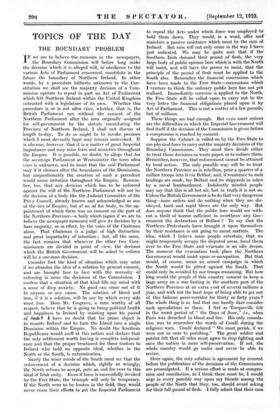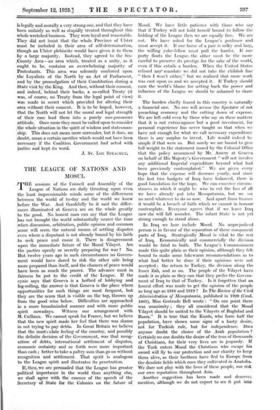TOPICS OF THE DAY
THE BOUNDARY PROBLEM
IF we are to believe the rumours in the newspapers, the Boundary Commission will before long make the decision which it is alleged will, in obedience to the various Acts of Parliament concerned, constitute in the future the boundary of Northern Ireland. In other words, by a procedure hitherto unknown to the Con- stitution we shall see the majority decision of a Com- mission operate to repeal in part an Act of Parliament which left Northern Ireland within the United Kingdom entrusted with a legislature of its own. Whether this procedure is or is not ultra vires, whether, that is, the British Parliament can without the consent of the Northern Parliament alter the area originally assigned for self-government by the statute constituting the Province of Northern Ireland, I shall not discuss at length to-day. To do so might be to invoke passions which I most devoutly hope may remain uninvoked. It is obvious, however, that it is a matter of great Imperial importance and may raise fears and anxieties throughout the Empire. It is possible, no doubt, to allege that for the sovereign Parliament at Westminster the term ultra vires is unknown, and to insist that the said Parliament may if it chooses alter the boundaries of the Dominions, but unquestionably the creation of such a precedent would cause irritation throughout the Empire. Remem- ber, too, that any decision which has to be enforced against the will of the Northern Parliament will not be the decision of a body like the Judicial Committee of the Privy Council, already known and acknowledged as one of the ties of Empire, but of an ad hoc body, to the ap- pointment of which there was no consent on the part of the Northern Province—a body which (again if we are to believe the newspaper rumours) will give its decision by a bare majority, or in effect, by the voice of the Chairman alone. That Chairman is a judge of high distinction and great impartiality of intention ; but, all the same, the fact remains that whenever the other two Com- missioners are divided in point of view, the decision which the British Government will be asked to enforce will be a one-man decision.
Consider first the kind of situation which may arise if we abandon the idea of a solution by general consent, and are brought face to face with the necessity of enforcing in arms the decisions of the Commission. I confess that a situation of that kind fills my mind with a sense of deep anxiety. No good can come out of it to anyone or any cause. The solution of blood and iron, if it is a solution, will be one by which every side must lose. Does Mr. Cosgrave, a man worthy of all respect, believe that he is going to bring political health and happiness to Ireland by insisting upon his pound of flesh I have no doubt that his prime object is to reunite Ireland and to turn the Island into a single Dominion within the Empire. No doubt the Southern Republicans would scoff at this notion and declare that the only settlement worth having is complete independ- ence and that the proper treatment for those traitors to Ireland who hold an opposite ideal, whether in the North or the South, is extermination.
Surely the wiser minds of the South must see that the enforcement of a• decision which, rightly or wrongly; the North refuses to accept, puts an end for ever to this ideal of Irish unity. Even if force is successfully invoked by the Free State, the triumph will only be temporary. If the North were to be beaten in the field, they would never cease their efforts to get the Imperial Parliament to repeal the Acts under which force was employed to hold them down. They would, in a word, offer and maintain a passive resistance which must be the ruin of Ireland. But ruin will not only come in the way I have just indicated. We may be quite sure that if the Southern Irish demand their pound of flesh, the very large body of public opinion here which is with the North will insist, and will have the power to insist, that the principle of the- pound of flesh must be applied to the South also. Remember the financial concessions which have been made to the Free State—concessions which I venture to think the ordinary public here has not yet realized. Immediately coercion is applied to the North; the Free State will be called upon to carry out to the very letter the financial obligations placed upon it by Act of Parliament. This is not a matter of a few pounds, but of millions.
These things are bad enough. But even more serious are the difficulties in which the Imperial Government will find itself if the decision of the Commission is given before a compromise is reached by consent.
Suppose the Cabinet is called on by the Free State to use physical force to carry out the majority decisions of the Boundary Commission. They must then decide either to treat those decisions as waste paper, or to enforce them: Remember, however, that enforcement cannot be attained by local action. The only possible way will be to treat the Northern Province as in rebellion, pour a quarter of a million troops into it via Belfast, and, if resistance to such landings are made, lay Belfast and its shipyards in ashes by a naval bombardment. Indolently minded people may say that this is all hot air, but in truth it is not so. Unless the British Government into do that very dangerous thing—issue orders and do nothing when they are dis- obeyed, hard and rapid blows are the only way. But does anyone think that the public here would see with- out a thrill of horror sufficient to overthrow any Gov- ernment the destruction of Belfast ? To say that the Northern Protestants have brought it upon themselves by their resistance is not going to mend matters. The idea, which I believe some people entertain, that we might temporarily occupy the disputed areas, hand them over to the Free State and evacuate is an idle dream. The moment the evacuation took place the Northern Government would insist upon re-occupation. But that would, of course, mean an armed campaign in which the North would be pitted against the South. That could only be avoided by our troops remaining. But how long would the people of this country consent to keep a huge army on a war footing in the southern part of the Northern Province at an extra cost of several millions a year, and with not the least hope of being able to get out of this hideous quasi-corridor for thirty or forty years ? The whole thing is so bad that one hardly dare consider such speculations as these. I feel as Tocqueville felt in the worst period of " the Days of June," i.e., when Paris was drenched in blood and fire. His only consola- tion was to remember the words of Conde during the religious wars. Conde declared' We must perish, if we were not so near to perishing." The great soldier and patriot felt that all sides must agree to stop fighting and save the nation in mere self-preservation. If not, the whole country would go under and never be able to revive.
Once again, the only solution is agreement by consent before the publication of the decisions of the Commission are promulgated. If a serious effort is made at compro- mise and conciliation, as I think there must be, I would urge in every possible way upon my friends among the people of the North that they, too, should avoid asking for their full pound of flesh. I fully admit that their case is legally and morally a very strong one, and that they have been unfairly as well as stupidly treated throughout this _whole wretched business. They were loyal and reasonable. They did not insist that the whole Province of Ulster must be included in their area of self-determination, though an Ulster plebiscite would have given it to them by a large majority. Instead, they agreed to the Six- County Area—an area which, treated as a unity, as it ought to be, contains an overwhelming majority of Protestants. This area was solemnly conferred upon the Loyalists of the North by an Act of Parliament, and by the promulgation of their Constitution during a State visit by the King. And then, without their consent, and indeed, behind their backs, a so-called Treaty (it was, of course, no Treaty from the legal point of view) was made in secret which provided for altering their area without their consent. It is to be hoped, however, that the North will not let the moral and legal strength of their case lead them into a purely non-possumus attitude. Once more they must be called upon to consider the whole situation in the spirit of wisdom and statesman- ship. This does not mean mere surrender, but it does, no doubt, mean a certain sacrifice which would not have been necessary if the Coalition Government had acted with justice and kept its word.
J. ST. LOE STRACHEY.











































 Previous page
Previous page